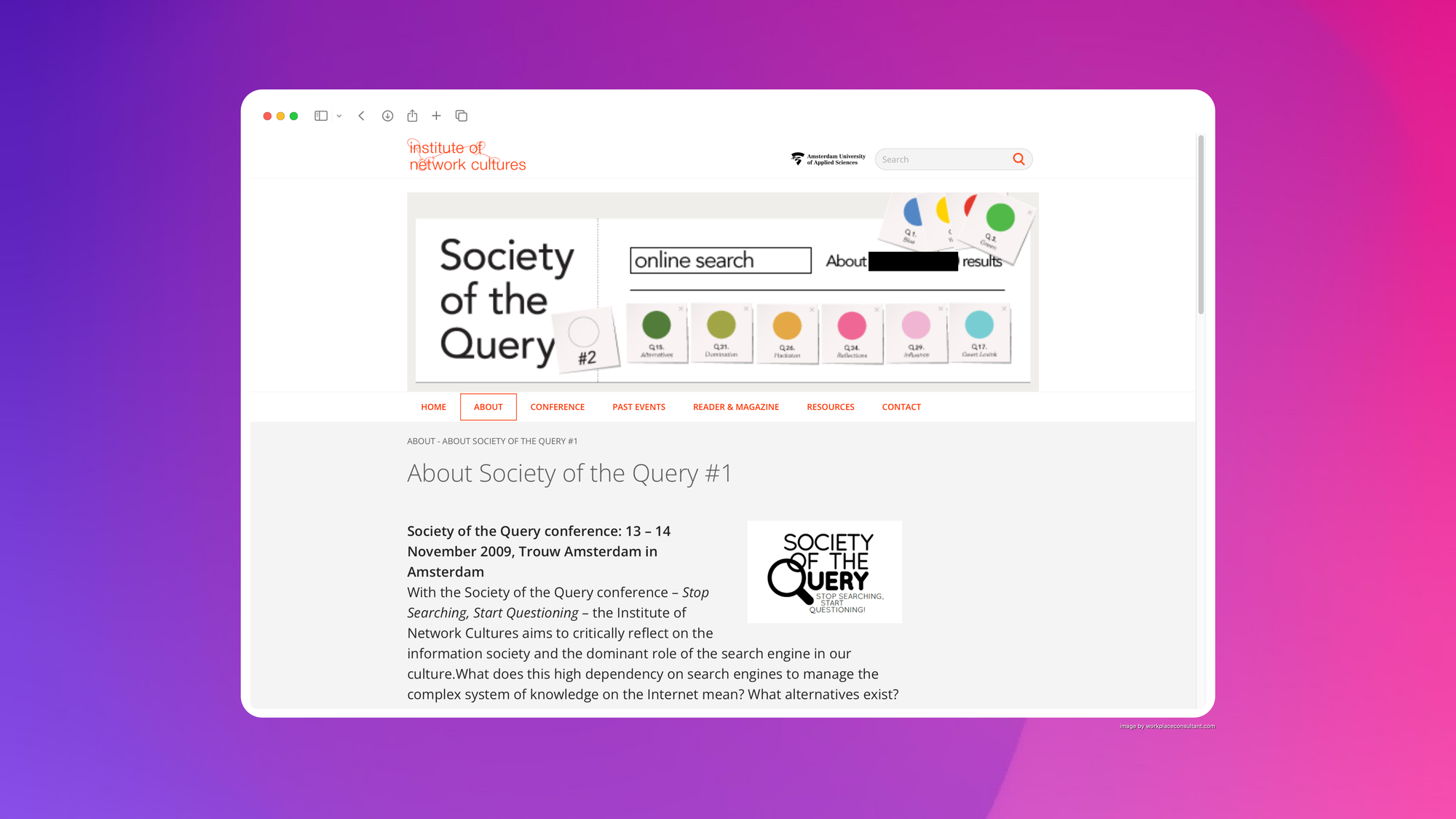Understanding New Media: Theories and Perspectives through conference attendance.

The Society of the Query and MoneyLab are public conferences that explore digital topics and their impact on society by engaging participants (professionals like academics, journalists, artists, and entrepreneurs) in discussions on these topics.
Society of the Query
The Society of the Query delves into digital technologies, such as search engines and their role in organising the information we consume, known as the organisation of online knowledge. A central question raised by the conference questions who determines what knowledge we have access to, how it is shaped and organised, and the potential limitations imposed by algorithms (Lovink, 2013).
Key themes addressed at the conference include media literacy’s [1] role in the information landscape, the influence of corporations [2] on the Internet and the pervasive impact of technology giants, the intersection of art and technology, and the significance of digital civil rights.
MoneyLab
The 'MoneyLab' Conference is organised by and for a diverse network of artists and activists with interest and knowledge the digital econonomy and financial topics. The conference originated from a concept paper titled "The New Media of Exchange: Dialogues on the Internet, Monetisation, and Finance," written by Geert Lovink and Nathaniel Tkacz in response to the ongoing financial crisis in 2012. Since its inception, the MoneyLab Conference has hosted six editions, each covering a diverse range of topics, including:
- New financial models like Crowdfunding
- Mobile money and its impact on financial inclusion
- Financial activism's role in economic change
- Blockchain's[3] potential for changing financial systems
Photo by Thought Catalog / Unsplash
Institute of Network Cultures
Both conferences are organised by the Institute of Network Cultures (INC), an Amsterdam-based group that hosts various events and conferences. Personally I find that the INC's importance comes from their fearless approach to critical digital society issues through research activities covering four main thematic areas that I've personally categorised based on my interests:
- Digital Information Systems, including digital publishing,[4] web content governance,[5] and online education;[6]
- Interactive Media, encompassing gaming culture[7] and media mobility;[8]
- Network Architecture, focusing on social media networks [9] and the semantic web;[10] and
- Future Technologies, exploring human-AI interaction,[11] peer-to-peer technologies,[12] and open source initiatives.[13]
Personal Experience
In 2013 and 2016, I had the opportunity to collaborate [14] with the INC during the Society of the Query and MoneyLab events as a blogger. My involvement with the INC began while pursuing my studies in New Media & Digital Culture at the University of Amsterdam. Since then, I have remained captivated by theoretical concepts, especially those related to new media consumption, the transition from traditional media to new media, web content governance, and digital publishing.
Photo by Google DeepMind / Unsplash
On this website, I will share some of my analyses that draw connections between the key themes explored during these conferences and new media theories. On this website, I will share some of my analyses that draw connections between the key themes explored during these conferences and new media theories.
If you would like to stay informed about new blog posts, subscribe. For broader context on financial crises, you can explore further by reading Early Lessons from the Financial Crisis (2012) by the International Monetary Fund (IMF).
Media literacy means being able to access, analyse, evaluate, create, and act using all forms of communication, recognising the role of media in society and possessing essential skills of inquiry and self-expression necessary for citizens of a democracy. ↩︎
Corporate Influence on Internet entails the impact of large technology companies on the structure, governance, and user experience of the internet, including issues of market dominance, data privacy, and content moderation. ↩︎
Blockchain technology is a decentralised digital record-keeping system that is distributed across multiple computers. Blockchain is known for its tamper-resistance which means that information recorded cannot be altered without consensus. This technology operates independently of central authorities, enabling transparent and trustless transactions. Cryptocurrencies allow direct peer-to-peer value transfers without the need for traditional financial institutions or central banks. ↩︎
Digital Publishing is the process of creating and disseminating information through digital means, often involving the production, distribution, and consumption of content in electronic formats. ↩︎
Web Content Governance is a set of policies, processes, and technologies used to manage digital content throughout its lifecycle, including creation, publication, and archiving. ↩︎
Online Education is a form of distance education where the dominant format of teaching and learning is via computer networks and where technology mediates the various forms of communication (student-teacher, student-student, student-content). ↩︎
Gaming Culture is a subculture formed by people who play video games and/or identify with the gaming community which is characterised by shared experiences, languages, and practices related to digital gameplay. ↩︎
Social media networks are web-based services. These services allow individuals to construct a public or semi-public profile, articulate a list of other users with whom they share a connection. Individuals can view and traverse their list of connections and those made by others within the system. ↩︎
The Semantic Web is an extension of the World Wide Web that aims to make internet data machine-readable, enabling computers to understand and process the meaning of information on the web. ↩︎
Human-AI Interaction entails the study of the relationship between humans and artificial intelligence systems, focusing on the design, evaluation, and implementation of interactive AI systems in human contexts. ↩︎
Open-Source Initiatives are collaborative projects that make their source code freely available for modification and redistribution, promoting transparency, community-driven development, and knowledge sharing. ↩︎
Media Mobility is the ability of media content to move freely across different platforms and devices, allowing for ubiquitous access and consumption of media. ↩︎
Peer-to-Peer Technologies is distributed network architectures where participants share a part of their hardware resources to provide the service and content offered by the network without the need for central coordination. ↩︎
At the Society of the Query 2016 conference, I wrote about the "The Dark Side of Google" book launch and Engin Bozdag's presentation on cultural influences on information diversity. ↩︎


